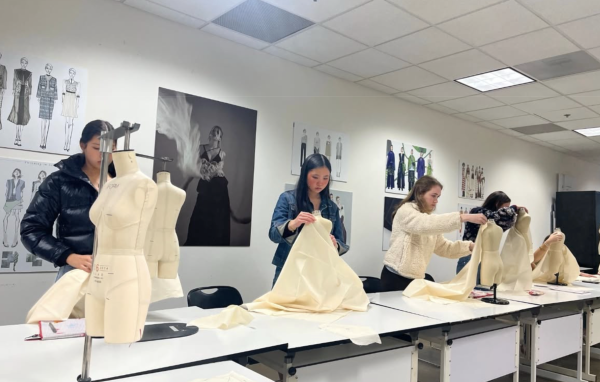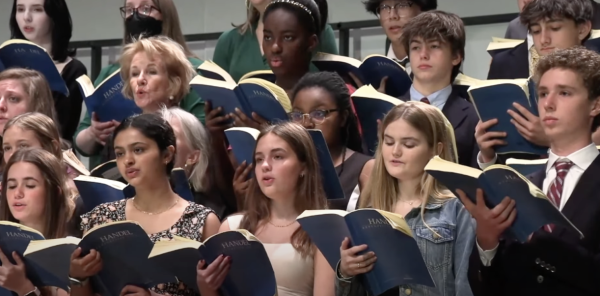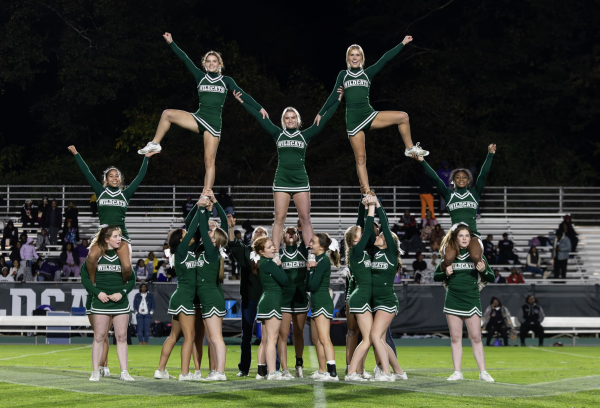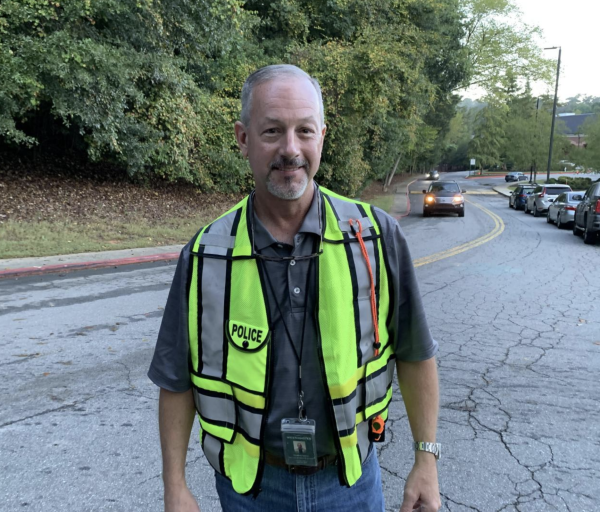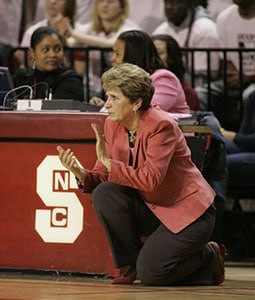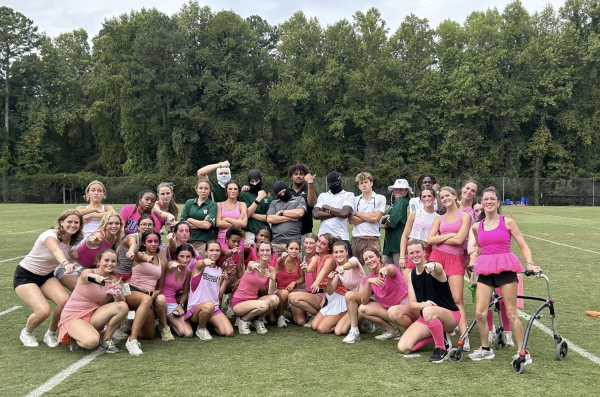Copeland to conduct Messiah for first time
The approach of Christmas and final exams signals the approach of one of the Upper School’s most important traditions: Messiah. This year, the audience will experience a different Messiah than that of previous years, as new choral director Mason Copeland will be taking over the conductor position from former choral director Fred Scott.
Orchestral and choral preparations begin around late October, but Copeland decided to start earlier than previous years due to his new position as conductor. Despite no experience with Messiah itself, Copeland is confident that his musical training will aid him.
“Music is a comprehensive, continual thing,” said Copeland. “Certainly when you have mastered an instrument, you can conduct. With my past experiences as an organist and singer, and having worked with the choir, I think I’m qualified.”
The major change along with Copeland’s arrival is the style in which Messiah will be presented. Orchestra director and performing arts chair Linda Cherniavsky, who had worked with Scott for many years, noted the difference.
“Mr. Copeland’s approach is a more authentic baroque practice, whereas Mr. Scott’s approach grows out of the Robert Shaw choral music tradition, which is not necessarily as tied to how the music would be played in Handel’s time, [during] the 18th century,” said Cherniavsky. “It was a more modern, large-chorus approach. We’re trying to work for a bit lighter style, faster tempi, and more shape and nuance in a new way.”
Despite the significant rearrangement, each year’s Messiah is unique because of the performers.
“It’s an ongoing learning,” said Cherniavsky. “Every musician brings their interpretation of the music to play.”
Copeland is aware of the difference between his and Scott’s style and interpretation, but believes they both create great effects. The baroque style Copeland uses has a more tonal sound and a steady, energetic pulse. The classical style Scott had used was suitable for chamber orchestras and expanded the scale form, making pieces more dynamic.
“There’s a difference between baroque and classical style,” said Copeland. “Mr. Scott had maybe more of a classical approach. I’m most comfortable with baroque music, so I chose to go the baroque way. I think there are certainly things we are doing that are classical, but my approach is more baroque.”
Students performing in Messiah sense a different type of musicality but still have great confidence in Copeland.
“Mr. Copeland brings different ideas about articulation, style, shaping, and other musical points,” said senior Isabelle Bellott-McGrath, who is part of concertino, the orchestra nonet that plays with vocal soloists. “I think it’s going to be a different feel from Mr. Scott, who has been [conducting] it for so long and had a hand in creating the phenomenon that is Messiah at Westminster, but we have yet to find out what new angles we’ll get from Mr. Copeland.”
Senior Benton Wood asserts students’ trust in Copeland’s leadership in Messiah.
“I think he’s very qualified,” said Wood. “We had a few rehearsals with him and he knows what he’s doing. I have full confidence in him.”
Copeland brings specific methods with him to help the chorus master the delivery of Messiah.
“First, we study the piece, understanding the structure, how it operates, and how it is executed,” said Copeland. “We start with count-singing quite often.”
The count-singing method he uses, called melisma, is practiced by using one syllable to sing many notes, and contrasts with Scott’s method of putting L’s in front of syllables, which Copeland believes to be more effective for huge groups.
Copeland notes that the orchestra contributes hugely to the success of Messiah. He is grateful for Cherniavsky’s orchestral expertise that helps him during rehearsals with the orchestra and concertino.
“Mrs. Cherniavksy is awesome. She’s so supportive. If I say something two or three times, she goes, ‘Guys, he said it two or three times,’” said Copeland. “It’s great to have someone in the room with string pedagogy to help out and give advice. We have a big team over here.”
Cherniavsky leads the orchestra to perfect the technically demanding repertoire of Messiah. For example, the piece “Rejoice” is one of the most difficult. The fast-paced, virtuosic violin part, for example, causes many string players to struggle when they first learn it.
“We’re always trying to play with greater accuracy, with a stronger sense of beauty,” said Cherniavsky. “We’re always engaged in striving towards perfection, but we never really get there. It’s like trying to realize an ideal.”
Copeland also commented on the performers, praising the amount of talent he witnessed.
“The talent here is incredible; commitment and dedication here are [also] incredible,” said Copeland. “I’m so impressed with all the soloists. There are professionals who wouldn’t come close. Our students are preparing quite well.”
Perhaps the most attractive factor for Copeland was the enthusiasm radiating from these students.
“What’s really impressive about Westminster compared to other schools was that two months ago, everyone was screaming, ‘When are we starting Messiah?”, said Copeland. “That enthusiasm is very refreshing and exciting to work with. I know that they’re there because they want to be, and that makes it so much more enjoyable.”
Students relayed their anticipation for this special tradition.
“It’s just festive,” said Wood. “It really puts me in the Christmas mood.”
Senior Lily Morgan, another orchestra member, was also enthusiastic about the start of Messiah.
“I love everything about Messiah – like literally everything,” said Morgan. “I wish we could start Messiah earlier in the year just because I love playing it so much!”
Senior Clark Conrad, chorus member, cherishes the opportunity to perform with alumni.
“My favorite part of Messiah is being able to sing with my friends who’ve graduated,” said Conrad.
The only aspect of Messiah these performers would like to change is the attentiveness of the rest of the student body on Friday morning.
“I wish the student body could appreciate the mastery, brilliance, emotion and technicality of it, but I don’t think they do, unfortunately,” said Bellott-McGrath. “I like that students have to hear us, but I wish they had some background context or some way of interacting with the performance to make it better.”
Morgan also voiced this concern about the one troubling part of Messiah.
“The morning the audience is composed of 800 half-awake high schoolers who really don’t have a huge interest in 18th-century oratorios, but the evening performance is mostly alumni, parents, and other Westminster families,” said Morgan. “It’s a lot more fun.”
Messiah marks Copeland’s first big project after coming to Westminster, and he hopes to expand his vision and make significant impact on the chorus program here.
“I want to build the program,” said Copeland. “We actually have a small program for our school, but I wish we had more singing awareness. That’s my goal: to give everyone an appreciation for singing so that while they’re learning and developing skills here, the real appreciation happens later on in life. The more the merrier!”
If anyone has creative ideas for recruitment, Copeland will be waiting in the chorus room excitedly.
